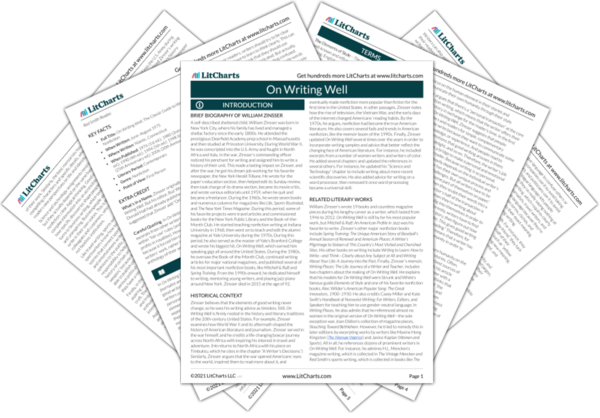The Human Element
In On Writing Well: The Classic Guide to Writing Nonfiction, William Zinsser offers guidance for anyone who wants to improve their writing skills. While the book is most relevant to people whose day-to-day lives are based around writing (e.g., students, writers, and journalists), Zinsser thinks that anyone can learn to write effectively in any genre, as long as they’re willing to put in the necessary time and effort. He argues that all good writing…
read analysis of The Human ElementSimplicity vs. Clutter
Throughout On Writing Well, William Zinsser repeats one piece of advice more than any other: be clear, direct, and precise. Inexperienced writers tend to think that they’ll sound intelligent if they use complicated language, but Zinsser believes that this is wrong. With very few exceptions, the best writers use as few words as possible and try to say exactly what they mean. They stick to plain English, no matter their job or field of…
read analysis of Simplicity vs. ClutterProcess and Organization
For William Zinsser, the writing process is really about solving a series of problems about what to say and how to say it. While most writers rightfully focus on refining their style and finding a compelling story, Zinsser thinks that few pay enough attention to how their books and articles should be structured. In fact, Zinsser argues that structure is the most “untaught and underestimated skill” in the writing profession, so he dedicates plenty…
read analysis of Process and Organization
The Gift of Writing
On Writing Well is a book about how to write, but it’s also a book about how to become a writer and what writing can do in the world. William Zinsser doesn’t just tell his readers how to put words on a page—he also tells them why it matters when they do so. He loves writing because it allows him to pursue his curiosity and share his discoveries with other people. But good writing also…
read analysis of The Gift of Writing






